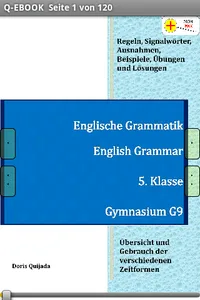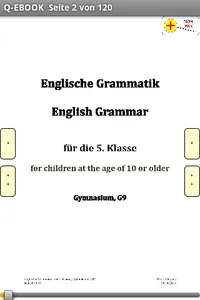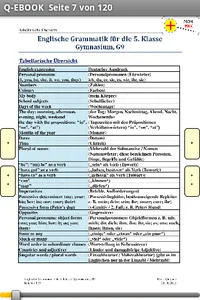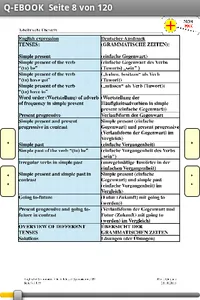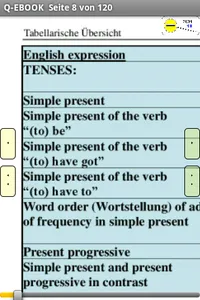A book from the 5th class for pupils, parents and teachers. G9
(Suitable for Baden-Württemberg, Bavaria, Berlin, Brandenburg, Bremen, Hamburg, Hesse, Mecklenburg-Western Pomerania, Lower Saxony, North Rhine-Westphalia, Rhineland-Palatinate, Saarland, Saxony, Saxony-Anhalt, Schleswig-Holstein, Thüringen)
Personal pronouns subject forms (personal pronouns (pronouns) (subject forms))
Numbers (figures)
Colours (colors)
My body (my body)
School subjects (school subjects)
Days of the week (weekdays)
The day: morning, afternoon, evening, night, weekend (the day: morning, afternoon, evening, night, weekend)
The day with the prepositions "in" "on" "at"
Times of day with "in" "on" "at"
Months (months)
Dates (Date)
Time (time)
Opposites (opposites)
Plural of nouns (majority of nouns (these denote persons, things, concepts))
"Be" "(to) be" as a verb ("to be" as a verb (Tuwort))
Questions with forms of "(to) be" (issues with forms of the verb "to be")
"Have got" as a verb ("have, possess" as a verb (Tuwort))
Questions with "have got / has got" (questions with the verb "have, possess")
Short answers with "have got / has got" (short answers with "have, possess")
"Have to" as a verb ("must") as a verb (Tuwort))
Questions with "have to" (questions with the verb (Tuwort) "must")
Short answers with "have to" (short answers with the verb "must")
"Can", "can"
Questions with "can" questions with the verb "can"
"Can", "may"
"May", "may"
Imperatives (commands, prompts)
Possessive determiners (Possessivbegleiter, possessive companion)
Possessive form (s-genitive / Case 2)
Personal pronouns: object forms (personal pronouns: object shapes)
Handsome and any ("some" "something" "a few" or "none")
Much ("lot") and many "many"
Word order in subordinate clauses (word order in subordinate clauses)
Countries in Europe (European countries)
Plural words (plural words) singular words (Einzahlwörter)
Verbs with prepositions
(Verbs (Tuwörter) with prepositions (prepositions)
Special features in the German or English
Tenses (GRAMMATICAL TIMES)
Simple Present (simple present)
Negative statements (denied declarative sentences) in Simple Present
Yes / no questions (ruling) in Simple Present
Questions with question words (Questions with question words)
Short answers (short answers)
("Be" simple presence of the verb) Simple Present of the verb '(to) be "
Questions with forms of "(to) be" (issues with forms of "to be")
"(To) have got" as a verb ("have, possess" as a verb (Tuwort))
Questions with "have got / has got" (questions with the verb "have, possess")
Short answers with "have got / has got" (short answers with "have, possess")
Simple Present of the verb '(to) have to "(simple present of the verb" must ")
Questions with "(to) have to" (questions with the verb (Tuwort) "must")
Short answers with "have to" (short answers with the verb "must")
Word order (word order) of adverb of frequency (of frequency) in present simple (simple present)
Present Progressive (progressive form of the present)
Negative statements (denied declarative sentences) in present progressive
Questions in the Present Progressive (questions)
Short answers (short answers)
Simple Present and Present Progressive in contrast
Simple Past (past simple)
("Be" simple past of the verb) Simple past of the verb '(to) be "
Positive statements (affirmative declarative sentences) in Simple Past
Irregular verbs (irregular Tuwörter)
Negative statements (denied declarative sentences)
Questions and answers short (short questions and answers)
Simple Present and Simple Past in contrast
Going to-future (future / future tense with GOING TO)
Positive statements (affirmative declarative sentences)
Negative statements (denied declarative sentences)
Questions and answers short (short questions and answers) in going to-future
Present Progressive and going to-future in contrast
(Onset form of the presence of going to-future tense in comparison)
DIFFERENT tenses (OVERVIEW grammatical TIMES)
Solutions (solutions)
Author: Doris Quijada
(Suitable for Baden-Württemberg, Bavaria, Berlin, Brandenburg, Bremen, Hamburg, Hesse, Mecklenburg-Western Pomerania, Lower Saxony, North Rhine-Westphalia, Rhineland-Palatinate, Saarland, Saxony, Saxony-Anhalt, Schleswig-Holstein, Thüringen)
Personal pronouns subject forms (personal pronouns (pronouns) (subject forms))
Numbers (figures)
Colours (colors)
My body (my body)
School subjects (school subjects)
Days of the week (weekdays)
The day: morning, afternoon, evening, night, weekend (the day: morning, afternoon, evening, night, weekend)
The day with the prepositions "in" "on" "at"
Times of day with "in" "on" "at"
Months (months)
Dates (Date)
Time (time)
Opposites (opposites)
Plural of nouns (majority of nouns (these denote persons, things, concepts))
"Be" "(to) be" as a verb ("to be" as a verb (Tuwort))
Questions with forms of "(to) be" (issues with forms of the verb "to be")
"Have got" as a verb ("have, possess" as a verb (Tuwort))
Questions with "have got / has got" (questions with the verb "have, possess")
Short answers with "have got / has got" (short answers with "have, possess")
"Have to" as a verb ("must") as a verb (Tuwort))
Questions with "have to" (questions with the verb (Tuwort) "must")
Short answers with "have to" (short answers with the verb "must")
"Can", "can"
Questions with "can" questions with the verb "can"
"Can", "may"
"May", "may"
Imperatives (commands, prompts)
Possessive determiners (Possessivbegleiter, possessive companion)
Possessive form (s-genitive / Case 2)
Personal pronouns: object forms (personal pronouns: object shapes)
Handsome and any ("some" "something" "a few" or "none")
Much ("lot") and many "many"
Word order in subordinate clauses (word order in subordinate clauses)
Countries in Europe (European countries)
Plural words (plural words) singular words (Einzahlwörter)
Verbs with prepositions
(Verbs (Tuwörter) with prepositions (prepositions)
Special features in the German or English
Tenses (GRAMMATICAL TIMES)
Simple Present (simple present)
Negative statements (denied declarative sentences) in Simple Present
Yes / no questions (ruling) in Simple Present
Questions with question words (Questions with question words)
Short answers (short answers)
("Be" simple presence of the verb) Simple Present of the verb '(to) be "
Questions with forms of "(to) be" (issues with forms of "to be")
"(To) have got" as a verb ("have, possess" as a verb (Tuwort))
Questions with "have got / has got" (questions with the verb "have, possess")
Short answers with "have got / has got" (short answers with "have, possess")
Simple Present of the verb '(to) have to "(simple present of the verb" must ")
Questions with "(to) have to" (questions with the verb (Tuwort) "must")
Short answers with "have to" (short answers with the verb "must")
Word order (word order) of adverb of frequency (of frequency) in present simple (simple present)
Present Progressive (progressive form of the present)
Negative statements (denied declarative sentences) in present progressive
Questions in the Present Progressive (questions)
Short answers (short answers)
Simple Present and Present Progressive in contrast
Simple Past (past simple)
("Be" simple past of the verb) Simple past of the verb '(to) be "
Positive statements (affirmative declarative sentences) in Simple Past
Irregular verbs (irregular Tuwörter)
Negative statements (denied declarative sentences)
Questions and answers short (short questions and answers)
Simple Present and Simple Past in contrast
Going to-future (future / future tense with GOING TO)
Positive statements (affirmative declarative sentences)
Negative statements (denied declarative sentences)
Questions and answers short (short questions and answers) in going to-future
Present Progressive and going to-future in contrast
(Onset form of the presence of going to-future tense in comparison)
DIFFERENT tenses (OVERVIEW grammatical TIMES)
Solutions (solutions)
Author: Doris Quijada
Show More
